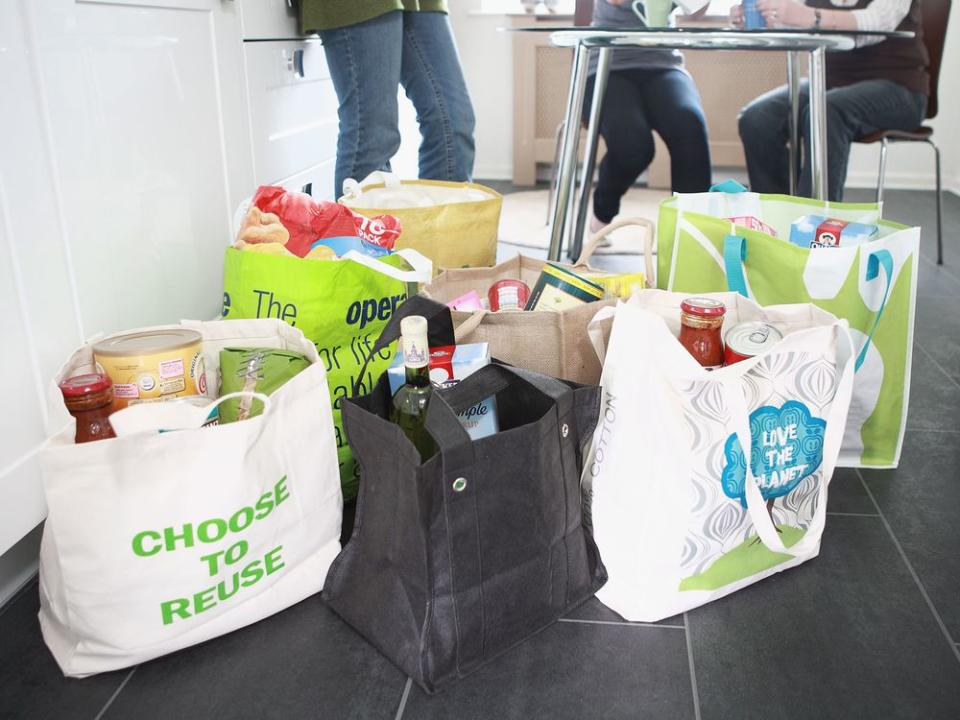Reusable Shopping Bags Pose a Similar Problem to Single-Use Plastic, Study Suggests
In 2015, England's Department for Environment, Food and Rural Affairs announced that from October of that year onward, retailers and supermarkets would be required to charge an extra five pence for each single-use plastic bag that shoppers took from the store. The government's reasons for the upcharge weren't entirely surprising: they just hoped that the 5p-per-bag price increase might encourage shoppers to take their own reusable bags when they bought groceries and, as a result, it might cut back on the amount of plastic waste that filled landfills, affected wildlife, and littered the streets.
The government said that, in 2014, every person in England carried "something like" 140 plastic bags home with them every year—despite the fact that the average household still had around 40 plastic bags in a closet or kitchen cabinet somewhere. (Indeed, sometimes it feels like adulthood is just filling one plastic bag with several dozen plastic bags, and repeating the process until you die.)

Anyway, British supermarkets started selling what they call 'bags for life,' which are thicker plastic bags that everyone hoped shoppers would reuse and reuse until they fell apart—and then they could be returned to the store and swapped for a replacement bag. But according to a new report from the Environmental Investigation Agency (EIA) and Greenpeace, those supposedly 'better' plastic bags are actually making things worse.
The 5p charge did contribute to an 83-percent reduction in the number of single-use plastic that were handed out by the 10 biggest grocery retailers—but that could be because people were just buying those 'bags for life' instead and, even worse, they're treating those bags like they are disposable single-use bags too. It's a troubling assertion, given that many U.S. states and municipalities have enacted similar charges and reusable options are increasingly available at grocery stores nationwide.
"In 2019, 10 companies representing 94.4% of the [U.K.] grocery retail market reported [the distribution of] over 1.5 billion bags for life, equivalent to about 16 million per 1% market share," the two agencies wrote. "This is an increase of about 26% on a market share basis, representing approximately 54 bags for life per household in the UK from the 10 supermarkets. It is clear from this data that many people are simply swapping 'single-use’ plastic bags for these plastic bags for 'life.'"
According to the data, some of the biggest supermarket chains reported "enormous" increases in the sale of bags for life. (Tesco, the chain that accounts for more than a quarter of the U.K.'s grocery market share, said that it sold 283 million more bags for life in 2019 than it did in 2018.) This is problematic for a number of reasons, and not just because bags for life have a "significantly higher" plastic content than their single-use counterparts.
"Grocery retailers need to tighten up targets to drive real reductions in single-use packaging and items," Juliet Phillips, an ocean campaigner at EIA, told The Guardian. "We need to address our throwaway culture at root through systems change, not materials change—substituting one single-use material for another is not the solution."
EIA and Greenpeace think that it could be time to hit shoppers' wallets a little harder, because 5p clearly isn't getting the job done. In the Republic of Ireland, sales of bags for life fell by 90 percent after supermarkets raised the price to €0.70 each. The two agencies have suggested that 70p ($0.90) might be a good starting point, and if that doesn't work, then the government might need to step in and ban them entirely.
Suddenly that free public radio tote bag is looking like a more attractive option than ever.

